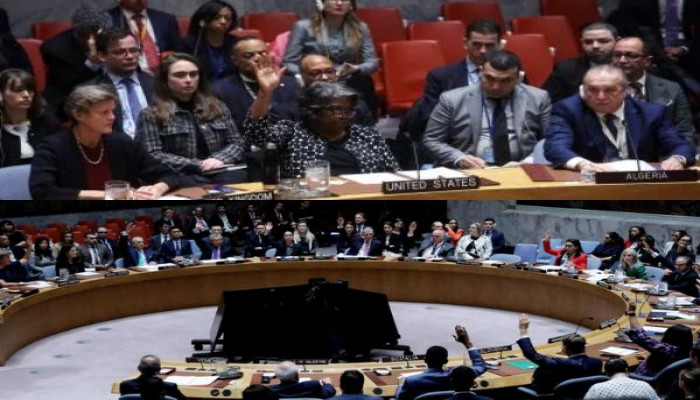U.S. vetoes UNSC resolution on Gaza ceasefire, faces global isolation
- In Reports
- 08:07 PM, Sep 19, 2025
- Myind Staff
The United States has once again vetoed a United Nations Security Council resolution on Thursday that called for an immediate and permanent ceasefire in Gaza and the release of hostages, saying it did not go far enough in condemning Hamas.
The other 14 members of the Security Council voted in favour of the resolution, which described the humanitarian crisis in Gaza as “catastrophic” and urged Israel to remove all restrictions on aid for the 2.1 million Palestinians living there.
“U.S. opposition to this resolution will come as no surprise,” Morgan Ortagus, a senior U.S. policy adviser, said before the vote. “It fails to condemn Hamas or recognise Israel’s right to defend itself, and it wrongly legitimises the false narratives benefiting Hamas, which have sadly found currency in this council.”
She also said that other council members “ignored” U.S. concerns about the “unacceptable” language and instead pushed “performative action designed to draw a veto.”
The result underlined the isolation of the U.S. and Israel on the international stage during the nearly two-year-long war in Gaza. The vote came just days before the annual U.N. General Assembly session, where Gaza will be a key issue and where major U.S. allies are expected to recognise an independent Palestinian state, a move strongly opposed by Israel and the U.S. but supported by countries such as the U.K. and France.
The resolution, which was drafted by the council’s 10 elected members serving two-year terms, went further than earlier versions to underline the “deepening of suffering” among Palestinian civilians.
“I can understand the anger and frustration and disappointment of the Palestinian people who might be watching this session of the Security Council, hoping that there is some help in the pipeline, and this nightmare could be brought to an end,” said Riyad Mansour, the Palestinian ambassador to the U.N. “I can imagine the anger and frustration that it did not happen.”
Algeria, which helped lead the resolution, also voiced regret at another failed attempt, apologising to Palestinians for not being able to protect civilians.
Despite the failure, Algeria’s U.N. ambassador Amar Bendjama said, “14 courageous members of this Security Council raised their voice. They have acted with conscience and in the cause of the international public opinion.”
Pakistan’s ambassador called the vote, which came during the 10,000th meeting of the Security Council, “a dark moment.”
Danny Danon, Israel’s ambassador to the U.N., criticised the resolution, saying it would “not release the hostages and will not bring security to the region.”
“Israel will continue to fight Hamas and protect its citizens, even if the Security Council prefers to turn a blind eye to terrorism,” he said in a statement.
The resolution repeated earlier demands for the release of all hostages taken by Hamas and other groups during their October 7, 2023, attack in southern Israel, which triggered the war in Gaza.
The U.S. has blocked similar resolutions since November, arguing that a ceasefire was not directly tied to the unconditional release of hostages and would strengthen Hamas.
The latest draft voiced “deep alarm” over a recent report by the world’s leading food crisis authority, which said famine had already gripped Gaza City and could spread across the territory unless a ceasefire was reached and restrictions on aid were lifted.
Israeli forces, meanwhile, continued a new ground offensive in Gaza City that began on Tuesday, intensifying a conflict that has destabilised the region and made any ceasefire more unlikely.
The Israeli military has said its goal is to “destroy Hamas’ military infrastructure” but has not given a timeframe, with signs that the operation could last for months.
On the same day, a group of independent experts appointed by the U.N. Human Rights Council said Israel is committing genocide in Gaza, urging the international community to stop it and hold those responsible accountable.
Last week, the U.N. General Assembly voted overwhelmingly to support a two-state solution and called on Israel to agree to the creation of a Palestinian state.
The U.S. veto comes as about half of Americans now believe that Israel’s military action in Gaza has “gone too far,” according to a survey by The Associated Press NORC Centre for Public Affairs Research, compared with 40 per cent in November 2023.
At the same time, Americans overall, especially Republicans, are less likely to say that negotiating a ceasefire should be a top U.S. priority than they were earlier this year when the U.S. was directly involved in ceasefire talks with Hamas.







Comments